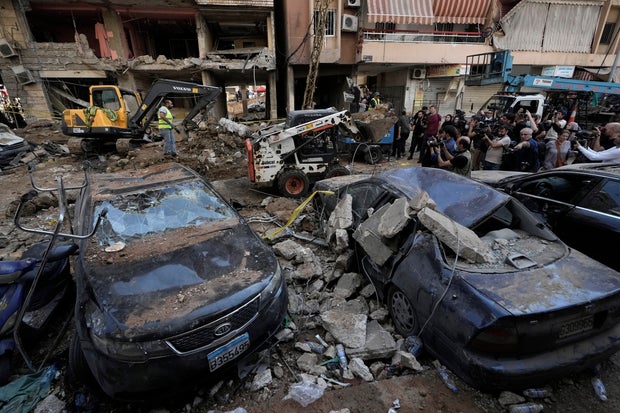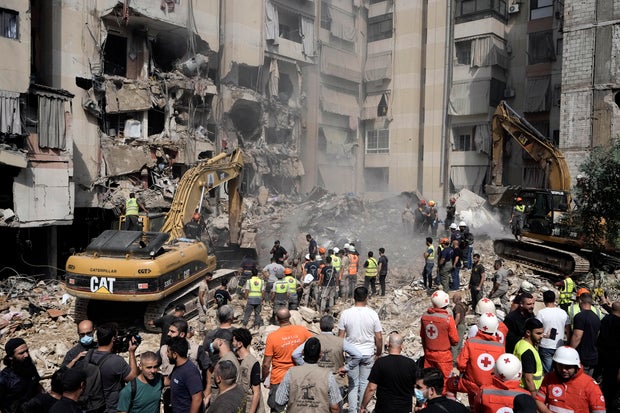Death toll rises in Israeli army ‘targeted attack’ that killed Hezbollah commanders

The death toll of a “Targeted attack” by the Israeli army In a suburb of Beirut, the number of cases stands at 37, including seven women and three children, the Lebanese health minister said on Saturday.
Firass Abiad told reporters that 68 people were also injured in the attack, 15 of whom were still hospitalized. He added that search and rescue operations were ongoing and the number of casualties was likely to rise.
The strike – the deadliest in the Lebanese capital since the 2006 war between Israel and Hezbollah – hit a densely populated southern neighborhood on Friday afternoon, during rush hour, as people were returning home.
Bilal Hussein / AP
The Israeli military said Saturday it had killed 16 Hezbollah members. The dead included Hezbollah commander Ibrahim Aqil, who led the elite Radwan force, and Ahmed Wahbi, another senior member of the group’s military wing. Iran-backed Hezbollah said late Friday that 15 of its members had been killed by Israeli forces, but did not specify where the deaths occurred.
The United States had previously offered a “reward of up to $7 million for information leading to the identification, location, arrest and/or conviction” of Aqil, who it said was a Hezbollah leader in the 1980s, when the group claimed responsibility for the bombing of the U.S. Embassy in Beirut in 1983, which killed more than 300 people, and the bombing of the U.S. Marine barracks in October 1983, which killed 241 U.S. personnel.
White House national security adviser Jake Sullivan called Akil’s death a “good outcome” and said he had “American blood on his hands” for the embassy attack.
“You know, 1983 seems like a long time ago,” Sullivan said. “But for a lot of families and people, it’s still happening every day.”
Wahbi has been described as a commander who played a major role in Hezbollah for decades and was imprisoned in an Israeli prison in southern Lebanon in 1984. Hezbollah said he was one of the “field commanders” during a 1997 ambush in southern Lebanon that left 12 Israeli soldiers dead.
Members of the militant group were meeting in the basement of the building that was destroyed, the Israeli military said.
Lebanese troops cordoned off the area, preventing residents from accessing the destroyed building, while members of the Lebanese Red Cross stood nearby to retrieve bodies found under the rubble. On Saturday morning, Hezbollah’s press office took journalists on a tour of the airstrike site, where workers were still digging through the rubble.
Public Works and Transport Minister Ali Hamie told reporters at the scene that 23 people were still missing.
The airstrike on busy Qaim Street destroyed an eight-story building with 16 apartments and damaged another next door. The missiles destroyed the first building and ripped through the basement of the second, where the Hezbollah officials were meeting, according to an Associated Press reporter at the scene.
In a nearby building, shops were badly damaged, including one selling clothes that had a sign in English that read: “DRESS LIKE YOU’RE ALREADY FAMOUS.”
Bilal Hussein / AP
The White House had already warned Israel and Iran-backed Hezbollah against “any escalation” following this week’s synchronization explosions of pagers and walkie-talkies targeting Hezbollah members. Israeli warplanes have carried out dozens of strikes in southern Lebanon and Hezbollah continued to retaliate.
At least 37 people, including two children, were killed in the explosions of pagers and walkie-talkies. Some 2,900 others were injured in the attack, widely blamed on Israel.
Lebanon’s health minister said Saturday that hospitals across the country were full of wounded.
Israel has neither confirmed nor denied its involvement in the attack, but CBS News has learned that U.S. officials were notified by Israel about 20 minutes before the operation began in Lebanon on Tuesday. No specific details about the methods used have been released.
Israel and Hezbollah have exchanged fire regularly since Hamas’s October 7 offensive on southern Israel triggered the Israeli military’s devastating Gaza offensive. But previous cross-border attacks have mostly hit evacuated areas of northern Israel and less populated areas of southern Lebanon.
Earlier this week, Israel’s security cabinet said halting Hezbollah attacks in the north of the country to allow residents to return home was now an official war aim, as it considers a broader military operation in Lebanon that could trigger a full-scale conflict. Israel has since sent a powerful fighting force to the northern border.
The retaliatory strikes forced tens of thousands of people to evacuate their homes in southern Lebanon and northern Israel.







